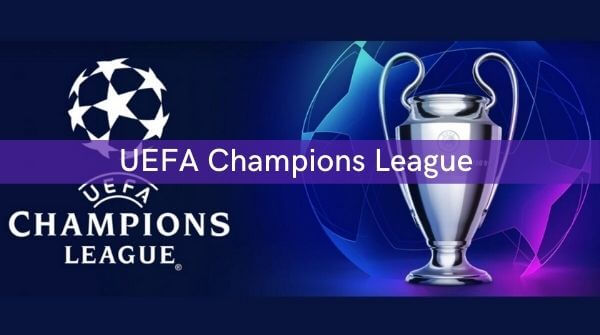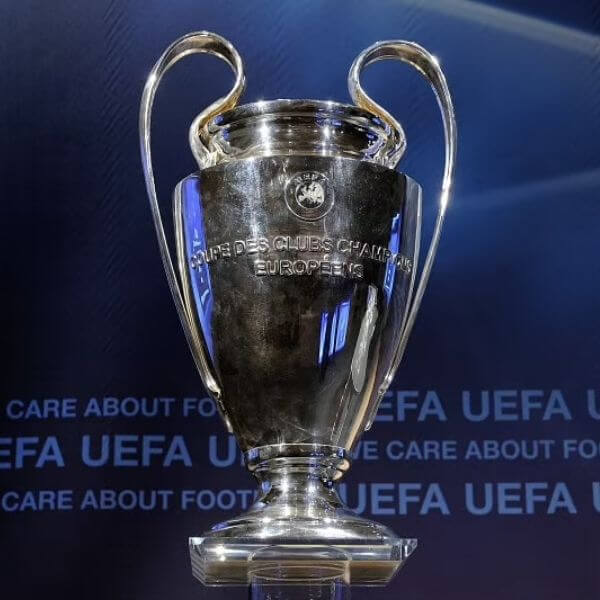To begin with, nothing can beat a good Champions League night. Wait, in case you’re wondering what the Champions League is, then this is just the article for you. The Champions League is like the World Cup of football but on a slightly smaller scale and Europe’s biggest and strongest teams compete to get their hands on this prestigious cup. So in this article, we shall look at everything about the UEFA Champions League right from its history to the teams participating, the champions league results, UCL matches, and much more.

Start Of The UEFA Champions League
The first hints of having a continent-wide championship cup came up in 1948, when L’Equipe editor, Gabriel Hanot received reports of a successful Campeonato Sudamericano de Campeones (South American Championship of Champions). Consequently, Hanot started proposing the creation of a tournament similar to the South American Championship. Finally, Gabriel somehow managed to persuade UEFA and in 1955, in Paris, the first European Champions Cup (Now known as the UEFA Champions League) came to life.

16 teams took part in the first edition of the UCL matches ( Formerly known as the European Champions Cup) and these teams included Milan, AGF Aarhus, Anderlecht, Djurgården, Gwardia Warszawa, Hibernian, Partizan, PSV Eindhoven, Rapid Wien, Real Madrid, Rot-Weiss Essen, Saarbrücken, Servette, Sporting CP, Stade de Reims, and Vörös Lobogó. However, out of the 16 teams, Real Madrid the Spanish giants won the first-ever European Champions Cup. In 1992, UEFA partnered with a marketing agency, TEAM Marketing AG and since then, the European Champions Cup has become the UEFA Champions League. Also, TEAM Marketing AG has been in association with UEFA ever since and exclusively market for the UEFA Champions League.
Qualifying For the UEFA Champions League
Firstly 32 teams qualify for the final Champions League matches and there are two ways to qualify for a spot in these 32 positions. To begin with, teams that fall into the first 4 positions of their national league directly qualify for the UCL. However, the number of teams that directly qualify depends on a certain quotient given to the associate member nations. For example the higher the quotient is the more number of teams directly qualify from that particular association. Furthermore, the team that just misses the direct qualification gets a chance to qualify for the UCL by winning a qualifying tournament.

Also, a team needs to obtain a license from its national association to be able to participate in the Champions League. However, the club needs to meet certain requirements in order to get the license. After that, once the 32 UEFA Champions League teams have qualified, they are split into 8 groups of 4. Each team plays every other team in their group at home as well as away. Then the top 2 teams from each group qualify for the round of 16.
Similar to the group stage, in the knockout stage, each team plays two UCL matches, once at home and once away. After that comes the quarters, semis, and then, of course, the grand finale.
Appointment Of Referees
UEFA Champions League has a refereeing unit that is broadly segregated into 5 categories and the referees are appointed from the same.
Ranking
Furthermore, these categories are based on experience. So initially except referees from France, Italy, Spain, England, and Germany, the remaining referees are placed into category 4, and referees from the above-mentioned nations are directly placed into category 3. Furthermore, each referee is evaluated post every game and can improve his ranking twice per season.
Appointment
The UEFA referee committee appoints referees for the UEFA Champions League matches and furthermore, they are appointed on the basis of their fitness levels and previous game evaluations. In addition, to prevent any sort of bias the referee cannot be of the same origin of any of the teams being referred by him/her. Also, the appointed referee is kept confidential until 2 days before the game.
Criteria
A UEFA referee cannot be over the age of 45 as all the referees have to maintain a certain level of fitness and hence this rule came into the picture and is followed since 1990.
Prizes and Awards
It’s no doubt that the UEFA Champions League has some major awards and prizes for its participants and best performers in the UCL matches, after all, it is one of the biggest football events in the world. So let us take a look at the most prominent awards and prizes of the Champions League.
Individual Awards

- UEFA Men’s Best Player
- UEFA Best Player In Europe
- Best Goalkeeper, Defender, Midfielder, and Forward
- UEFA Coach Of The Year
- Technical Observers Best Goal Of The Season
- Fans Goal Of The Tournament
Trophies And Medals

Firstly, a 74 cm tall silver trophy is awarded to the winning team of the UEFA Champions League and Jürg Stadelmann designed this prestigious trophy, and the original was awarded to the first-ever winners, Real Madrid. Till 2008, any club that won three years in a row or emerged victorious 5 times in the UCL received the original trophy permanently. However, since 2008, a replica is given to the winning team and the official trophy resides with UEFA.
UEFA Champions League Prize Money
- Preliminary qualifying round: €230,000
- First qualifying round: €280,000
- Second qualifying round: €380,000
- Third qualifying round: €480,000
- Base fee for group stage: €15,250,000
- Group match victory: €2,700,000
- Group match draw: €900,000
- Round of 16: €9,500,000
- Quarter-finals: €10,500,000
- Semi-finals: €12,000,000
- Runner-ups: €15,000,000
- Champions: €19,000,000
UEFA Champions League Results Till Date
| Club | Number Of Titles Till Date | Seasons Won |
|---|---|---|
| Real Madrid | 13 | 1956, 1957, 1958, 1959, 1960, 1966, 1998, 2000, 2002, 2014, 2016, 2017, 2018 |
| Milan | 7 | 1963, 1969, 1989, 1990, 1994, 2003, 2007 |
| Bayern Munich | 6 | 1974, 1975, 1976, 2001, 2013, 2020 |
| Liverpool | 6 | 1977, 1978, 1981, 1984, 2005, 2019 |
| Barcelona | 5 | 1992, 2006, 2009, 2011, 2015 |
| Ajax | 4 | 1971, 1972, 1973, 1995 |
| Manchester United | 3 | 1968, 1999, 2008 |
| Inter Milan | 3 | 1964, 1965, 2010 |
| Juventus | 2 | 1985, 1996 |
| Benfica | 2 | 1961, 1962 |
| Nottingham Forest | 2 | 1979, 1980 |
| Porto | 2 | 1987, 2004 |
| Celtic | 1 | 1967 |
| Hamburger SV | 1 | 1983 |
| Steaua București | 1 | 1986 |
| Marseille | 1 | 1993 |
| Borussia Dortmund | 1 | 1997 |
| Chelsea | 1 | 2012 |
| Feyenoord | 1 | 1970 |
| Aston Villa | 1 | 1982 |
| PSV Eindhoven | 1 | 1988 |
| Red Star Belgrade | 1 | 1991 |

Real Madrid is the only team to have won the prestigious title 13 times and not only does Real Madrid have the most Champions League titles but they also managed to win 3 titles in succession in 2016, 2017, and 2018.
Top Goal Scorers
To begin with, we have Cristiano Ronaldo at the top of the list with 130 goals in 170 UCL matches. Following him is Lionel Messi in second place with 115 goals to his record. Then comes former Real Madrid skipper Raul with 71 goals to his name and just behind him is nonother than Robert Lewandowski with 68 goals. After that, we have Karim Benzema in 5th place with 65 goals followed by Ruud Van Nistelrooy with 56 goals. Then French legend Thierry Henry takes the 7th position with 50 goals from 112 UCL matches and right behind him is Alfredo Di Stefano with 49 goals in 8th place. Lastly, we have Andriy Shevchenko and Zlatan Ibrahimović sharing 9th place with 48 goals each.
Also click here to read about all the records in the UCL till date.
Sponsorship
Similar to the FIFA World Cup, the UEFA Champions League is sponsored by a group of companies as compared to top-flight leagues that are sponsored by just a single major sponsor. Also, in 1992, UEFA decided that a maximum of 8 companies will be allowed to sponsor the Champions League. Last season’s sponsors included Gazprom, Expedia Group, Heineken International, Mastercard, Nissan, PepsiCo, Santander, and Sony PS5. Furthermore, the sponsors are allocated 4 hoardings around the pitch. In addition, the sponsors were given pre and post-UCL match interview logo placements as well as a certain number of tickets to each game.
Advertising is allowed on the player’s jerseys however it is restricted to displaying only one sponsor other than the jersey manufacturer. Additionally, exceptions are made for Non-Profit Organisations which can be displayed on the front or back of the player’s jersey. Also if a club plays a match in a nation where a certain product cannot be advertised, then the team has to wear a jersey without that sponsor displayed for that game.
Also, click here to read about Cricket Vs Football which one is more interesting.
FAQ’s Regarding UEFA Champions League
Cristiano Ronaldo is the highest goalscorer in the Champions League with 130 goals in 170 Champions League matches and is followed by none other than Lionel Messi in second place with 115 goals in 143 UCL matches.
The Spanish footballing giants Real Madrid have won the most number of Champions League titles (13) till date. Moreover, Los Blancos won the title three times in a row in 2016, 2017, and 2018.
The biggest Champions League result till date is Liverpool’s 8-0 win against Besiktas in the 2007 UCL.
Till date, the most number of hat tricks is shared by the two greatest footballers of all time, Lionel Messi and Cristiano Ronaldo, who have scored 8 Champions League hat tricks each.
The 6 time Ballon D’or winner has clinched the UEFA trophy 4 times till date in his career.
Editor’s Note | UEFA Champions League
In conclusion just like the FIFA World Cup, the UEFA Champions League brings out a friendly competitive spirit among football fans all across the globe. Moreover, the UCL has become home to phenomenal skills, upcoming superstars, and just pure footballing talent. Furthermore, many teams get to display their talents to other parts of the world, and seeing youngsters rise through the ranks and come in the spotlight through the Champions League is simply amazing. Moreover, it is really fascinating to see how managers play out different tactics, gameplay, and formations. Overall the Champions League is really something one must watch, irrespective if you are a football fan or not, the UEFA Champions League definitely won’t let you down if you’re looking for some action-packed, nerve-wracking footballing action.

